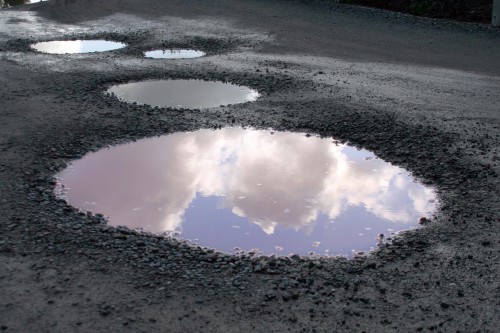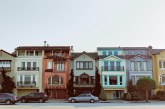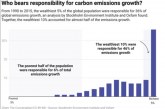
As the meeting unexpectedly went late into the evening, the council converged in agreement on a revenue measure – actually two – for the June ballot. One meeting after opening the door again to a UUT (Utility User Tax), the council went back to supporting two separate parcel taxes.
It was Councilmember Will Arnold who made the initial motion to put a straight parks tax renewal at $49 on the ballot. The tax would be at the same level as the one passed in 2006 and 2012, but this time it would have a two percent annual inflator and be a 20-year term. Councilmember Lucas Frerichs seconded the motion.
Councilmember Frerichs then added an amendment for the second parcel tax – a parcel tax at $99 for transportation infrastructure. This one, basically a new tax primarily for roads, would be a 10-year tax, with an inflator not to exceed two percent.
There would be some jockeying on the form of the tax, but the basic structure held up for a 5-0 vote for staff to bring it back at next meeting with the specific resolution.
A key question was what the transportation infrastructure tax should fund. It was decided that the tax would fund streets, bike lanes, bike paths, and sidewalks, along with traffic maintenance including signals, signs, and striping. Eliminated from the list were public facilities, surface parking lots, and transit stops.
“No new infrastructure here,” Mayor Robb Davis clarified.
Councilmember Arnold opposed attempts to change the costs for single versus multi-family dwelling units. “I’m not willing to accept any amendment about reducing that rate. Again it adds to lack 
of clarity about who’s paying what and how much. There are some equity issues – I think they can be addressed if we think it’s too much of an ask. “
Another question was the length of the term. Will Arnold, who made the original motion, told his colleagues, “I still want somebody to try to convince me to go permanent on the parks, I’m not hearing that.”
Mayor Pro Tem Brett Lee asked, “Under what circumstances can you see us not needing that money 20 years from now?” He continued, “The $49 ask is pretty modest. I think if we’re honest with ourselves, I can’t imagine a scenario where we wouldn’t need that money and I think that trend is that it is more difficult over time to pass tax measures.”
He said, “If we’re going to have it low at $49 and then risk not being able to renew in 20 years, I’m not sure we’re doing ourselves a favor.”
On the other hand, Lucas Frerichs countered, “Not sure I really want to go in the permanent route.” As he pointed out, “I think it really creates another level of accountability.”
There were also several proposals to reduce the overall amount from $99 to $80 (as Brett Lee suggested) or $79 (for which Rochelle Swanson tried to get an amendment).
Brett Lee suggested the possibility that a lower, but longer parcel tax for roads would allow the council to potentially bond off the measure and gain more money in the short-term for roads. However, staff suggested they would need to go a minimum of 20 years to do that.
Will Arnold was not supportive of that idea.
“I don’t see an appetite for 20 years for a new parcel tax,” he said. “I think if we’re not going to go permanent on the parcel tax, which I’m hearing, I feel like we’re being about as ambitious as we can be on that.”
Councilmember Swanson, as stated above, proposed amending the transportation parcel tax to $79.
Will Arnold was reluctant, saying, “I wanted to be even more ambitious in terms of dollar amount.”
Rochelle Swanson did add, “I’m looking for cheerleaders here, that’s going to be the next part of this. There better be some serious cheerleaders in this community that’s been asking us to take a smaller bite.”
“We’re going too low for me,” Mayor Robb Davis jumped in on the $79 versus $99 question. “I’m not supportive of $79. I don’t sense it from Lucas (Frerichs), I think he wants to stay closer to $99.”
“The principal that Brett (Lee) laid out last week – we weren’t going to try to fund the full amount with our tax – that was an important statement that we made,” he explained. “My fear has always been that people would say we weren’t bold enough.
“Remember the last parks tax, we weren’t bold enough. We’ve covered that a little bit through inflators. We’ve covered a little of that through a recognition that there’s only so much that we can ask of the community and we’ve also said, future councils need to look for opportunities to grow revenue and to contain costs,” he continued.
“We’ve said all those things, we don’t have clear plans for all those but we’re basically acknowledging to the community that yes, we can only come to you and request a certain amount in taxation,” he said. “We’re asking for half of what we think the gap is. We’re closing half the gap that we’ve identified carefully over a period of time. That’s what we’re saying. That’s the message.”
The rest will be up to cost savings and other revenue sources to make the gap smaller.
Again, the council ultimately voted 5-0 to have staff come back to them with the actual revenue measure at the next meeting.
The next question is whether the community will support it. A key supporter, however, came up in line earlier in the meeting. Alan Pryor, who had been against the tax, seemed to be on board during public comment.
Alan Pryor foreshadowed the ultimate measure during his public comment.
He said, “I think if you ask almost anyone in this city, what do you got to fix, they’re going to tell you it’s the street surfaces. I really think that’s what you should be focusing on.”
He added, “I think the people of Davis will pony up for street surfaces and bike paths, perhaps as much as $150.” He said, “They will want to keep their parks green, so I propose that we renew the parks tax at $49 a year.”
He suggested a $199 parcel tax. The council, following similar logic, is putting together two taxes, which gets them to $148 a year plus inflators.
—David M. Greenwald reporting







I was very supportive of a single tax measure at $199 with a CPI inflator for 6 years – $150 for road and bike path resurfacing and striping only and $49 for parks and recreational facility maintenance only. The key to my support was that there be assurances that the existing level of expenditures for each would not be reduced unless the City’s entire General Fund was reduced such as in a recession in which case the expenditures could be reduced by the same percentage drop.
Staff’s report suggested that the existing level of expenditures for roads and parks be maintained each year only as long as there was at least a 15% General Fund reserve that year. That did not come close to addressing my main concern which is that existing road and park expenditures could be easily siphoned of for employee compensation as has happened every time the City has raised a new tax in the past.. All new City Councils would have to do is give a big enough salary or benefit payment increase each year so that a reserve of 14.9% was established each year and they could avoid ponying up for the preexisting road and parks expenditures the public otherwise expected.
Will Arnold initially touched on the need to change the assurances provided to the public that existing expenditures on roads and parks could easily be subverted by just using the 15% General Reserve Fund threshold. But it was Robb Davis who hammered it home that the public absolutely needs concrete assurances than new taxes would not simply supplant existing expenditures. He insisted on language that truly protected these existing road and park expenditures from future cuts by specifying the existing expenditure levels be maintained in the future unless there is a General Fund drop due to recessionary pressures.
While I am generally supportive of the proposed taxes, I think the Council has made a HUGE political mistake by splitting it into two separate taxes. Having two separate taxes on the ballot makes it far too easy for a voter to simply say “I want my roads fixed but don’t care so much about the parks” (or vice versa) and simply vote only for one but not the other. I think this split vote scenario is far more likely that a voter saying, “It is just too much so I am no voting for neither”. If 2 similar measures (one for roads and one for parks is put on the ballot, I predict enough people would split vote that each measure would only get about 60% of the vote thus sending both to defeat because they did not meet the 2/3/threshold. required for a parcel tax passing.
Plus the logistics and efforts (and money) required to physically run two separate campaigns (one for each tax measure) is really overwhelming. It will require 2 separate campaign committees with two separate sets of periodic filings, two separate sets of accounting/bookkeeping, 2 different fundraising efforts to pay for 2 sets of signs, 2 different messages for mailings, etc. Both Robb Davis and Rochelle Swanson correctly stated there needed to be a community effort to step up and promote these tax measures but by putting two separate measures on the ballot they are inadvertently discouraging such citizen involvement and any citizen participation is going to be diluted toward supporting one measure or the other.
Brett Lee also suggested and the Council gave the nod for a parks tax length of 20 years (the proposed road tax only for 10 years) justifying it by saying we have a permanent library parcel tax of an inflator (which is now up to $105/year!) so he thinks the public will buy a longer parks tax because we will certainly will always have the need. But Brett fails to recognize that the Library Tax was passed in a different time and the voting electorate now is much more alienated by government and taxes in general. And citizens demand more government accountability which is not necessarily provided by a 20 year tax measure. Fortunately, the road tax is for a much shorter duration (10 years) but this may be far too long for the average citizen to be comfortable writing annual checks.
A final complaint I have about how these tax measure sausages were put together is that the list of acceptable expenditures under the road and parks measures is to broad. The Council wisely cut down on the list for the road parcel tax to just road and bike path resurfacing and striping which is what I suggested is what the public really wanted and could very easily and quickly be explained to voters.
But then Council added in traffic signals and signs and gutters, curbs, and sidewalks (fortunately, they left out bus stops). But I (and others) could still see huge amounts of moneys put into beautiful ADA accessible sidewalks with very specialized surfaces and street lights – like the recent work on 5th St and the corner of Poleline and Lillard in South Davis by the Safeway. All of these things are great if our basic street needs were being me but inclusion of these things as legitimate expenditures for road tax money could see huge amounts of the tax money gobbled up.
Or the City may decide these new tax monies could be used to beautify the Downtown-Richards Blvd under-crossing with “traffic signage” or completely re-signaling Richards and Olive due to the needs imposed by the big new Lincoln 40 development. Or start on a hugely expensive traffic light and signal replacement/upgrade program throughout town while still having bone-jarring potholes throughout our road and bike path system. All of these things may be nice but I think what the public really, really wants is to just keep our streets and bike paths paved and striped. Everything else should be superfluous until these basic needs are met. And I think voters would step up and fund these things if the message to them is clear.
The list of expenditures in the proposed parks tax is even worse and includes street lights and road medians and “public facilities” and non-Measure O open spaces and street tree maintenance among the myriad of acceptable uses. Again, all the public really wants is for their parks’ grass to be mowed and efficiently watered without waste (and maintained without chemicals), for the park trees and shrubs to be kept pruned to remove dead or diseased wood, and for the pools to be kept open and maintained. It is going to be really tough for whatever campaign committee is ultimately formed to get out clear messaging for this hodgepodge of other uses.
So as the current proposals are structured, I don’t think that a clear message and compelling case can be made to the public with sufficient clarity to ensure passage of the two separate proposed measures.
My recommendations for the Council are this:
1) Combine the parcel taxes into one measure with a max 10-year duration (6 years would be more likely to pass).
2) Make the list of acceptable uses for spending tax measure money much shorter and clearly laser-focused so there is no ambiguity as to what the public is getting for its money.
3) Make the language maintaining existing expenditures exceedingly clear so that current expenditures for the defined needs MUST be maintained except ONLY if the City’s General Fund otherwise drops – noting that the new tax money must always be spent on on the defined acceptable uses.
4) Of less importance, I’d make the inflator based on CPI instead of a fixed 2%. There is a high likelihood that inflation will raise its ugly head in a huge way in the near future and having a fixed inflator right now may be good because it is slightly higher than the inflation rate. But if inflation roars back into high single digits like we had in the 80s, our 2% inflator will be severely inadequate.
I am sure I am forgetting a few details but this is the gist of the minimum changes I think Council needs to do to ensure “yes” votes by the average Davisite.
Alan touches on an important point… what “index”?
‘Inflation’, but not necessarily the same as CPI? CCI (construction cost) which can also vary from general inflation AND CPI… interesting (and important) question… right now, don’t have a profound suggested answer… leaning towards CCI…
Alan
For those of us whose primary means of travel in our city is on foot, side walks are not a luxury, but a necessity, especially if much of that travel is done at night. I see the sidewalks as equally critical to the roadways and would appreciate it if more people realized that for the young and the aging ( those who do not or should no longer drive) , the quality of our sidewalks is critical.
And, by Streets and Highway code, that is why adjacent property owners are primarily responsible for the provision, maintenance, repair and replacement of the sidewalk abutting their property. It’s high time the rest of the City stop subsidizing those folk.
Get with it folk
When I lived in San Mateo the city came by and fixed the sidewalks in front of our houses and billed the adjacent homeowners for it. Maybe Davis needs to do the same.
Yep… as an engineering intern (SM), I did the sidewalk surveys (’74-’76)… SM noted the deficiencies, and gave the abutting owners the choice: fix them, or the City would, and lien the property for the cost, paid with property taxes. Now they have a 50-50 deal… result of prop 13 and and political pressure… Millbrae and Burlingame did the same…
The authority to charge the abutters is clear… the political will, not so much.
This quote, attributed to Brett Lee in the article above, highlights the basic problem we have here in Davis. Tax increases on residents are not a sustainable source of revenue for the City. At some point, perhaps sooner rather than later, residents are going to decide that they can no longer afford the taxes, at which point they will stop voting for them. What does the City do then?
If we want a sustainable revenue stream for the future it must come from the economic activity of local businesses, so the way forward for the City is not increasing taxes, but increasing economic development. Combine economic development with serious cost containment and we will no longer need these extra parcel taxes and the idea of sunsetting a tax will become a reality rather than a false promise.
There’s so much truth and good stuff in what Mark West wrote here.
Economic activity (and the resultant sales tax) is a more variable income stream than parcel and property taxes and complete reliance on them by the City would subject the City to the sometimes unpredictable vagaries of the economy leading to wild up and down swings in the City’s budget
That might be true if we were discussing only retail, but that isn’t the case. Companies that start here, grow up and expand to national/international levels like Schilling Robotics and Marrone Bio Innovations, provide far more to the community than just sales tax. A large portion of the property taxes received from these companies is from the specialized and often very expensive equipment inside the building (unsecured property) and is every bit as ‘stable’ as that from parcel taxes and property taxes for the building and land. Add to those, the multiplier effect of local employees with high paying jobs and you begin to understand the full impact of economic development.
“What does the City do then?”
The answer is simple: they start cutting services, they continue to defer maintenance. The way the city is run will fundamentally change, and for most people not for the better.
I agree with your last paragraph, but in the short-term, I don’t see a way to avoid the tax.
Without economic development and cost containment, there will be no ‘short-term.’ The taxes will be functionally permanent and will eventually go to support ever-increasing employee compensation. We have to stop that treadmill first, which is something that the current CC majority has refused to understand, let alone do.
“Without economic development and cost containment, there will be no ‘short-term”
Agreed. What is your short term solution if not by taxes?
You know the answer to that question, David, because it is the same thing I have been saying all along. A comprehensive plan starting with economic development and cost-containment, then adding new taxes as the last step to fill in the gaps. What we see with this CC majority (and every other one for the past 20 years) is to talk about economic development (but never implement) and then just raise taxes, with the requisite threat of cutting services thrown in for good measure. Until they make a serious effort at economic development and cost-containment, there is no reason to give them more tax money to spend.
Without cost-containment, any new tax revenues will eventually be used for compensation, regardless of what they ‘say’ the money is intended for. Even if we ignore what happened last century, we have nearly two decades of experience to prove that fact.
My opinion is that we need the proverbial “three legged stool”… right-sizing/cost containment, econ development, and increased revenues that a UUT/parcel tax can provide… only one of those legs appear to be easily and timely available. The other two, we should be working on, to get in place, as soon as possible…
Just as this has been said all along in the past the problem is 3 or 4 years from now when the city is coming back to us for yet another parcel tax we’ll be saying the same thing all over again. As they say, it’s time to sheeeet or get off the pot.
“the current CC majority has refused to understand, let alone do.”
Or perhaps, they see the issue from different perspectives.There is always the possibility that there is more than one way to interpret a problem or that it is possible to believe in a range of alternatives, some more nuanced than others, instead of fixating on only one solution.
Besides cost cutting or economic development what other revenue avenues does the city have besides just taxing us more Tia? I’m all ears?
You are absolutely right, Tia. Given that we have been following your preferred ‘tax me more, please’ approach for the past 50 years or so, and have those pesky unfunded obligations to thank for it, maybe we should stop ‘fixating’ and try something that actually works.
Ok… just in a bad mood… mea culpa… ‘gotta vent.
What’s this $49, $99 crap? Like it will pass @ $49, and not $50? @ $99, but not $100?
Reminds me of gas stations where they pose cost/gal @ X.YY and 9/10’s of a cent… c’mon!
Parks levy… $49, for how long since it started? Am thinking at least 15 years… 2% compounded for 15 years would make it $66… if 20 years (more likely) it would be @ $73… originally it was set @ around $90/year.
Half-stepping… pissing in the ocean… “there is no ‘try’… only do or not do” (Yoda); “fish or cut bait” (source unknown)… OK. Out of my system… said my piece…
Yep, it’s true. Even though it’s only a dollar difference, people perceive $49 as much cheaper than $50. It’s an anchoring effect. Perceivers anchor on the first digit and that is what sticks in their mind.
They are idiots… products of the educational system? And we’re talking PER YEAR? A tad over 8 cents per month…
2 cents per week…
Not aimed at you, Cindy (au contraire)… just frustrated… I think you understand… have a great 2018…
[moderator] Mellow out, ok?
“They are idiots… products of the educational system? ”
Wow
How do you explain it? Am open to alternative analysis… 2 cents /week… wow.
It’s very simple – it’s a subconscious response. It’s not even a matter of awareness.
There’s a reason retailers do that. It’s true how people perceive these things, even when they think they don’t.
The way I explain it to my students is in terms of us being cognitive misers. In order to process all of the information in our environment efficiently, we use mental shortcuts. These shortcuts can serve us well and probably do the majority of the time. But they can also lead to poor decisions that can be exploited by others.
Ok, whatever…
I still question the judgement of a voter who would play “the game” … based on one dollar/year…
in effect, you are saying they are highly malleable, and don’t think… scary…
It’s not a conscious judgment. It’s been a long time since I’ve kept up with the scholarly political psychology, but the psychology of voting is all based on shortcuts and affect-driven at times unconscious choices. It’s the same processing that gives things like unconscious bias their force.
Yep, pretty much. But I would call that being human.
Good explanation, Cindy…
Hope they learn to discern what is important, and what is not…
Your approach seems solid. Particularly,
VERY important lesson in life. I sincerely thank you for the approach you are taking. May all teachers teach that. And, may their students ‘grok’ that and act on it.
Wow… scary…
Following that logic, why not price DV subscriptions @ $9.95/month? or $9.99?
Probably could do that